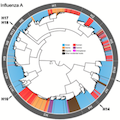Abstract
Since 2013, there have been several alarming influenza-related events; the spread of highly pathogenic avian influenza H5 viruses into North America, the detection of H10N8 and H5N6 zoonotic infections, the ongoing H7N9 infections in China and the continued zoonosis of H5N1 viruses in parts of Asia and the Middle East. The risk of a new influenza pandemic increases with the repeated interspecies transmission events that facilitate reassortment between animal influenza strains; thus, it is of utmost importance to understand the factors involved that promote or become a barrier to cross-species transmission of influenza A viruses (IAVs). Here, we provide an overview of the ecology and evolutionary adaptations of IAVs, with a focus on a review of the molecular factors that enable interspecies transmission of the various virus gene segments.
